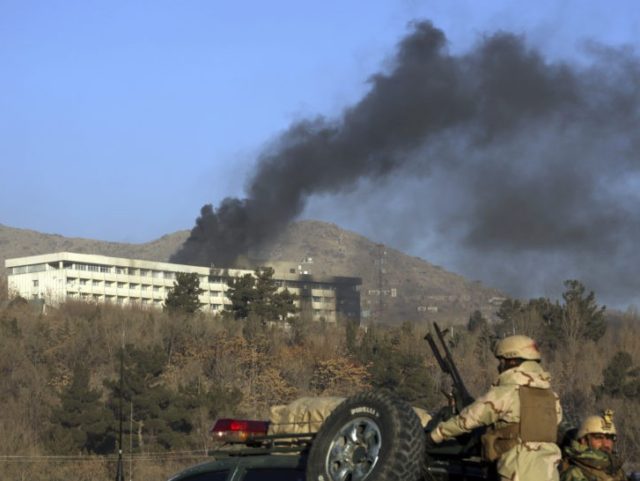Tajmir Jawad, deputy minister of intelligence for the Taliban junta in Afghanistan, boasted in a national television interview on Saturday that he organized a bloody 2018 suicide bombing in Kabul that killed more than a hundred people, including women and children.
پنج سال پیش در چنین روزی آمبلانس پر از مواد منفجره در چهارراهی صدارت شهر کابل منفجر کرد که در آن بیش از صد غیرنظامی به شمول زنان و کودکان جان باختند. طراح حملات انتحاری شهر کابل حالا در تلویزیون ظاهر شده و از کارهایش افتخار میکند. pic.twitter.com/1lry6TkVxb
— Tajuden Soroush (@TajudenSoroush) January 28, 2023
In the interview broadcast by Afghanistan’s Tolo News, Jawad cheerfully claimed he was the mastermind behind a January 2018 attack in which Taliban terrorists drove an ambulance packed with explosives through a police checkpoint and into a crowded street. The detonation killed over 100 people and injured at least 235 more.
According to the legitimate Afghan government at the time, the Taliban killers were able to get past the police checkpoint by claiming they were paramedics taking a badly wounded patient to a nearby hospital.
The government declared a national day of mourning after the attack, which left crowds of sobbing relatives gathered outside Kabul hospitals awaiting news of whether their loved ones had lived or died. Some Afghans were as angry with the government for failing to prevent the attack as they were at the Taliban for perpetrating it.
The Taliban took responsibility for the bombing, claiming it was a legitimate military action because the U.S. was supporting the Afghan government.
“If you go ahead with a policy of aggression and speak from the barrel of a gun, don’t expect Afghans to grow flowers in response,” said Taliban spokesman Zabihullah Mujahid, who became the junta’s deputy information minister after President Joe Biden’s disastrous withdrawal from Afghanistan in 2021.
The Long War Journal (LWJ) on Monday quoted two U.S. intelligence officials who confirmed Jawad was a Taliban commander and member of the Haqqani Network, the brutal criminal network which the embarrassed Biden administration bizarrely claimed was entirely distinct from the Taliban, even as numerous Haqqani operatives like Jawad took top posts in the Taliban government.
LWJ’s sources said Jawad was co-leader of a jihadi coalition called the Kabul Attack Network that included members from numerous terrorist gangs, including al-Qaeda. The syndicate also received support from Iran’s Islamic Revolutionary Guard Corps (IRGC), which is now recognized as an international terrorist organization by the U.S. government.
“The IRGC was financing some of the most spectacular attacks in the heart of Afghanistan, against U.S., NATO and Afghan security forces, as well as civilians,” noted LWJ’s Bill Roggio, who has testified to that effect in lawsuits brought by the families of slain American service members against the Iranian regime.
Roggio has been reporting on Jawad’s links to the Kabul Attack Network since 2013 when he noted Jawad was also a “senior Taliban propagandist” who directed the efforts of Zabihullah Mujahid, who in those times wrote under the name “Voice of Jihad” and passed along propaganda from the Haqqani Network.
Shortly after the fall of the Afghan government in 2021, several of its former security officials identified Jawad as a leader of the Kabul Attack Network, a top trainer of “martyrdom” terrorist operatives, and the architect of some of Kabul’s worst terrorist attacks. Western intelligence officials added that he was “tight with Pakistan’s security establishment.”
It is, therefore, entirely plausible that Jawad personally directed the Kabul ambulance attack as he claimed. He became a member of the Taliban’s “caretaker government” cabinet as First Deputy to Intelligence Chief Abdul Haq Waseeq on September 8, 2021.

COMMENTS
Please let us know if you're having issues with commenting.